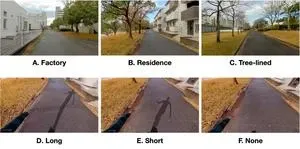(Press-News.org) Researchers with the University of Tennessee, Knoxville, and Oak Ridge National Laboratory are hosting an international symposium focused on efforts to make urban and rural communities healthy and resilient to changes in climate, demographics, natural resources and ecosystems.
The “Food-Energy-Water Bioeconomies for Net-Zero Transition” international conference will be March 18-20 in Knoxville. The interdisciplinary conference is sponsored through a U.S. National Science Foundation grant awarded to a team led by Jie (Joe) Zhuang, professor of environmental soil science in the UT Institute of Agriculture, to build a global transdisciplinary network of food, energy, and water (FEW)-converged research. This international project, called FEWSUS, is intended to help FEW-nexus researchers think at a systems level for exploring solutions to complex system problems and inspire outreach and engagement across nations and disciplines to support urban and rural co-prosperity as food, energy and water resources become more limited throughout the world.
The symposium will offer a transdisciplinary forum for researchers, stakeholders, and students to exchange and converge knowledge, perspectives, and practices as well as build collaborative teams in the following areas:
Circular bioeconomy systems
Net zero urban system
Sustainability of renewable energy technologies
Food-energy-water nexus for one-health ecosystems
“The goal of this conference is to synthesize publications that summarize current research and priority findings and needs to support convergence of future research, policy development, and stakeholder perception,” said Zhuang, who serves as the FEWSUS director.
An opening ceremony and keynote presentations will kick off the symposium on Monday, March 18. There will be presentations, discussions, workshops and tours for the participants.
Speakers hail from at least 16 countries including Argentina, Australia, Brazil, Chile, Colombia, Costa Rica, Croatia, Czech Republic, Ethiopia, Guatemala, Malaysia, the Netherlands, Uganda, United Kingdom, Uruguay, and the United States. Topics include reducing greenhouse gas emissions, renewable energy, sustainable development, climate-smart technologies, urban wetlands and agriculture, water pollution, precision livestock farming, bio-based batteries, among many others.
The conference is organized by Zhuang and Gretchen Neisler, vice provost for international affairs for UT Knoxville, with help from a 12-member committee. A scientific committee is chaired by David Zilberman professor in the Agricultural and Resource Economics Department at the University of California, Berkeley, and Brad Day, associate vice chancellor for research innovation initiatives at UT Knoxville.
For more information, visit the conference website: https://fewsus.utk.edu/2024-fewsus-international-symposium-knoxville-tn/.
The University of Tennessee Institute of Agriculture is comprised of the Herbert College of Agriculture, UT College of Veterinary Medicine, UT AgResearch and UT Extension. Through its land-grant mission of teaching, research and outreach, the Institute touches lives and provides Real. Life. Solutions. to Tennesseans and beyond. utia.tennessee.edu.
END
International symposium to converge food-energy-water research for net zero development scheduled for March
Speakers from 16 countries will discuss topics surrounding sustainable urban and rural development
2024-02-29
ELSE PRESS RELEASES FROM THIS DATE:
Walking, reminiscing benefit brain health in older Black adults
2024-02-29
An innovative Oregon Health & Science University research program that enlists older Black adults to walk through and reminisce about historically Black neighborhoods in Portland — which now look very different after rapid change through gentrification — may help improve cognitive function, a new study finds.
The OHSU project has gained wide interest since its 2016 launch, with similar versions beginning to take root in Seattle and Oakland, California.
Now, newly published research suggests it may improve brain health in a population that’s disproportionately affected by Alzheimer’s disease. The study, published online ...
Uncovering the connections between autism, sensory hypersensitivity
2024-02-29
Supported by a $2 million R01 grant from the National Institutes of Health, the Auerbach Lab at the Beckman Institute for Advanced Science and Technology will examine how different genes associated with autism spectrum disorders may similarly impact our brain’s neurons, resulting in heightened sensitivity to sounds.
Autism spectrum disorders are genetically complex, and hundreds of genes are implicated in their development. As a result, some may conclude that autism is a collection of disconnected disorders with comparable symptoms. However, much like how roads converge as they approach a destination, at some level of brain function ...
Medical University of South Carolina neuroscientist honored for trailblazing pain management research
2024-02-29
Medical University of South Carolina neuroscientist Bashar Badran, Ph.D., was one of only 10 investigators nationwide recognized for their research at the fifth annual scientific meeting of the National Institutes of Health – Helping to End Addiction Long-Term (NIH HEAL) Initiative in Bethesda, Maryland. Badran received an honorable mention for the NIH HEAL Initiative Trailblazer Award.
The NIH HEAL Initiative provides funding to encourage scientific research into opioid use and pain management to fast-track progress in the face of the country’s current opioid epidemic. Its Trailblazer ...
Researchers decipher mysterious growth habit of weeping peach trees
2024-02-29
A basic premise of how plants grow is that shoots grow up and roots grow down. A new study, published in Plant Physiology, a leading international society journal published by the American Society of Plant Biologists, reveals the answer to a fascinating question: why do weeping tree varieties defy this natural growth pattern?
Researchers identified a protein called WEEP that is missing from the Weeping Peach Tree. Their results show how a DNA deletion in just one gene completely changes the localization of the hormone auxin, which ...
New study links hospital privatisation to worse patient care
2024-02-29
A new review has concluded that hospitals that are privatised typically deliver worse quality care after converting from public ownership. The study, led by University of Oxford researchers, has been published today in The Lancet Public Health (video summary available in the notes section)..
Lead author Dr Benjamin Goodair, postdoctoral researcher at the Department of Social Policy and Intervention at the University of Oxford, said: ‘This review challenges the justifications for healthcare privatisation and concludes that the scientific support for healthcare privatisation ...
Consistent evidence links ultra-processed food to over 30 damaging health outcomes
2024-02-29
Consistent evidence shows that higher exposure to ultra-processed foods is associated with an increased risk of 32 damaging health outcomes including cancer, major heart and lung conditions, mental health disorders, and early death.
The findings, published by The BMJ today, show that diets high in ultra-processed food may be harmful to many body systems and underscore the need for urgent measures that target and aim to reduce dietary exposure to these products and better understand the mechanisms linking ...
Significant proportion of cancer drugs lack proof of added benefit
2024-02-29
Many cancer drugs approved by the European Medicines Agency (EMA) between 1995 and 2020 lack proof of added benefit, particularly those approved through expedited (“fast track”) pathways, finds a study published by The BMJ today.
And despite pharmaceutical industry claims that high drug prices are needed to offset research and development (R&D) costs, the results show that more than half of these drugs, including those with minimal or no added benefit, recover R&D expenses within three years.
As such, the researchers call for better alignment between regulatory and reimbursement processes, particularly for drugs approved through expedited pathways, to promote development ...
The Lancet Public Health: Menu calorie labelling may reduce deaths from cardiovascular disease in England, modelling study suggests
2024-02-29
Peer-reviewed / Modelling study / People
The Lancet Public Health: Menu calorie labelling may reduce deaths from cardiovascular disease in England, modelling study suggests
The first estimates of the impact of the current calorie labelling legislation in England, which applies only to large out-of-home food businesses, suggests the policy could prevent or postpone about 730 deaths from cardiovascular diseases between 2022 to 2041.
Larger health benefits are estimated if the policy were to be implemented in all English out-of-home food businesses, with about 9,200 deaths from cardiovascular diseases potentially prevented over ...
Many new oncology drugs approved in the EU lack proof of added benefit
2024-02-29
A new study conducted by researchers from Utrecht University sheds light on the dynamics of added benefit and revenues of oncology drugs approved by the EMA between 1995 and 2020. The findings, published today, reveal significant insights. The research team consisted of Francine Brinkhuis, Wim Goettsch, Aukje Mantel-Teeuwisse, and Lourens Bloem, affiliated with the Pharmacoepidemiology and Clinical Pharmacology division at Utrecht University.
The study aimed to evaluate the added benefit and financial outcomes ...
Could fiber optic cable help scientists probe the deep layers of the moon?
2024-02-29
An increasing number of seismologists are using fiber optic cables to detect seismic waves on Earth—but how would this technology fare on the Moon, and what would it tell us about the deep layers of our nearest neighbor in space?
In Seismological Research Letters, Wenbo Wu of Woods Hole Oceanographic Institute and colleagues explore the idea of deploying a fiber seismic network on the Moon, discussing some of the challenges to overcome.
They also test this hypothetical network using artificial seismograms created from data collected by seismometers placed on the Moon’s surface ...
LAST 30 PRESS RELEASES:
Stem cells from human baby teeth show promise for treating cerebral palsy
Chimps’ love for crystals could help us understand our own ancestors’ fascination with these stones
Vaginal estrogen therapy not linked to cancer recurrence in survivors of endometrial cancer
How estrogen helps protect women from high blood pressure
Breaking the efficiency barrier: Researchers propose multi-stage solar system to harness the full spectrum
A new name, a new beginning: Building a green energy future together
From algorithms to atoms: How artificial intelligence is accelerating the discovery of next-generation energy materials
Loneliness linked to fear of embarrassment: teen research
New MOH–NUS Fellowship launched to strengthen everyday ethics in Singapore’s healthcare sector
Sungkyunkwan University researchers develop next-generation transparent electrode without rare metal indium
What's going on inside quantum computers?: New method simplifies process tomography
This ancient plant-eater had a twisted jaw and sideways-facing teeth
Jackdaw chicks listen to adults to learn about predators
Toxic algal bloom has taken a heavy toll on mental health
Beyond silicon: SKKU team presents Indium Selenide roadmap for ultra-low-power AI and quantum computing
Sugar comforts newborn babies during painful procedures
Pollen exposure linked to poorer exam results taken at the end of secondary school
7 hours 18 mins may be optimal sleep length for avoiding type 2 diabetes precursor
Around 6 deaths a year linked to clubbing in the UK
Children’s development set back years by Covid lockdowns, study reveals
Four decades of data give unique insight into the Sun’s inner life
Urban trees can absorb more CO₂ than cars emit during summer
Fund for Science and Technology awards $15 million to Scripps Oceanography
New NIH grant advances Lupus protein research
New farm-scale biochar system could cut agricultural emissions by 75 percent while removing carbon from the atmosphere
From herbal waste to high performance clean water material: Turning traditional medicine residues into powerful biochar
New sulfur-iron biochar shows powerful ability to lock up arsenic and cadmium in contaminated soils
AI-driven chart review accurately identifies potential rare disease trial participants in new study
Paleontologist Stephen Chester and colleagues reveal new clues about early primate evolution
UF research finds a gentler way to treat aggressive gum disease
[Press-News.org] International symposium to converge food-energy-water research for net zero development scheduled for MarchSpeakers from 16 countries will discuss topics surrounding sustainable urban and rural development





